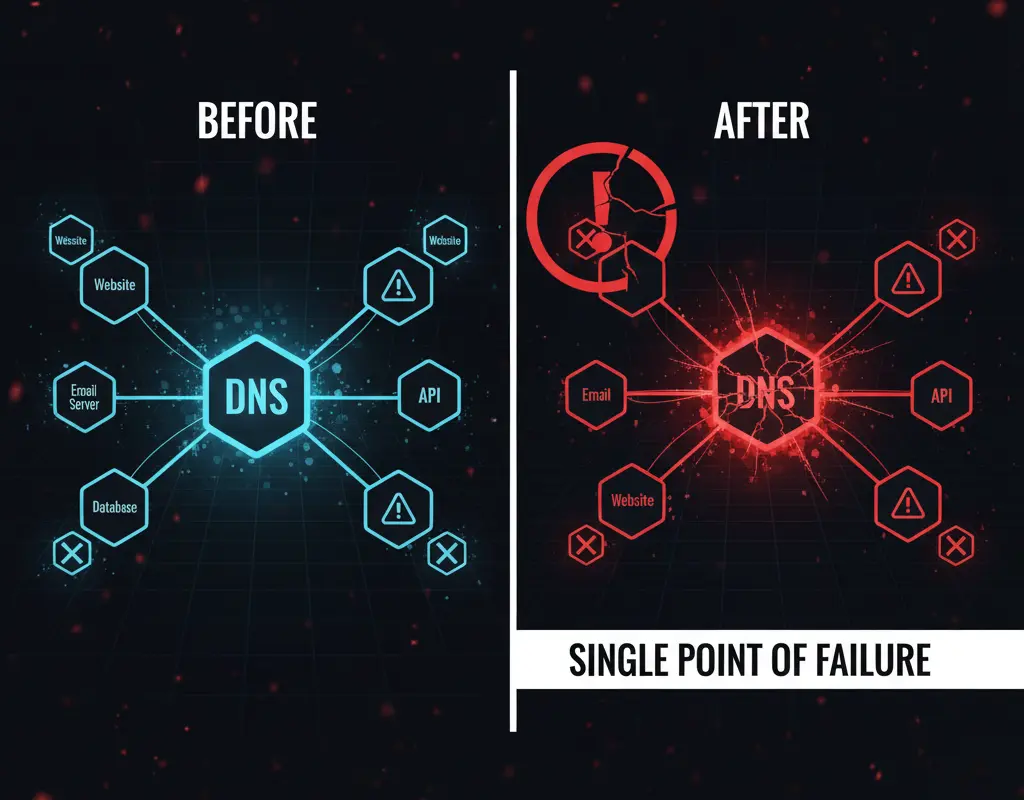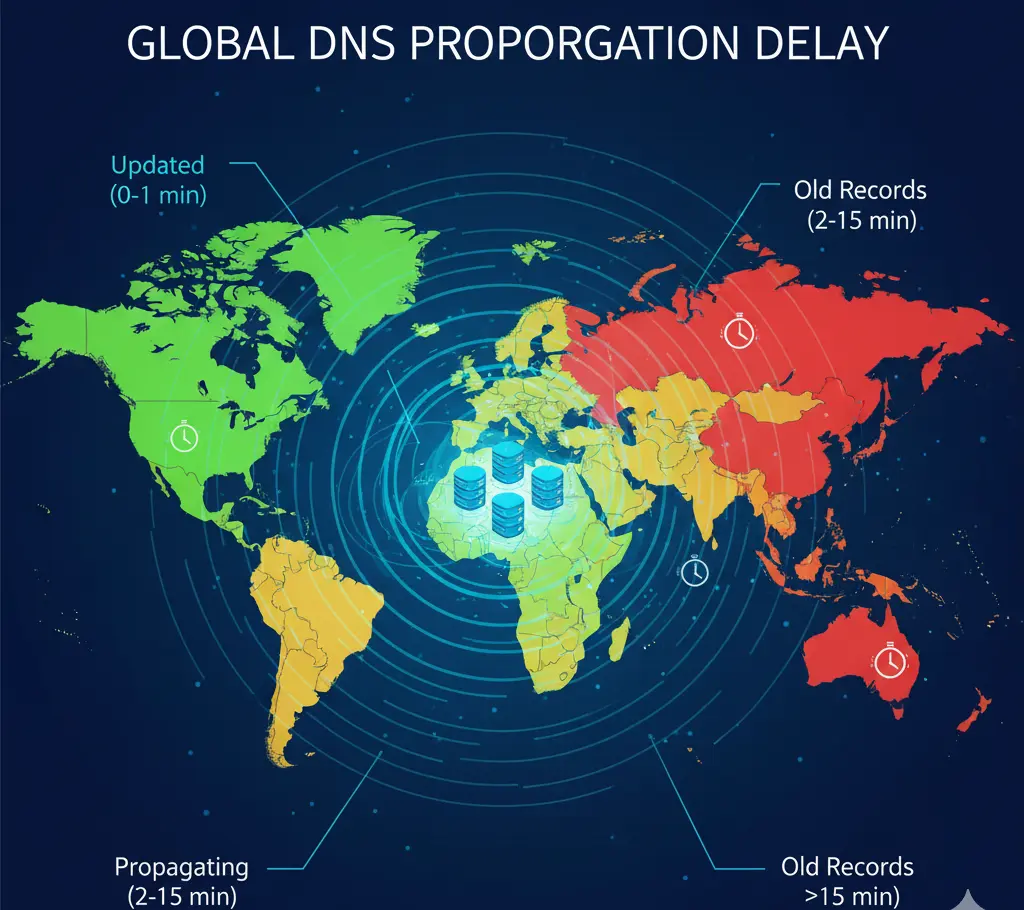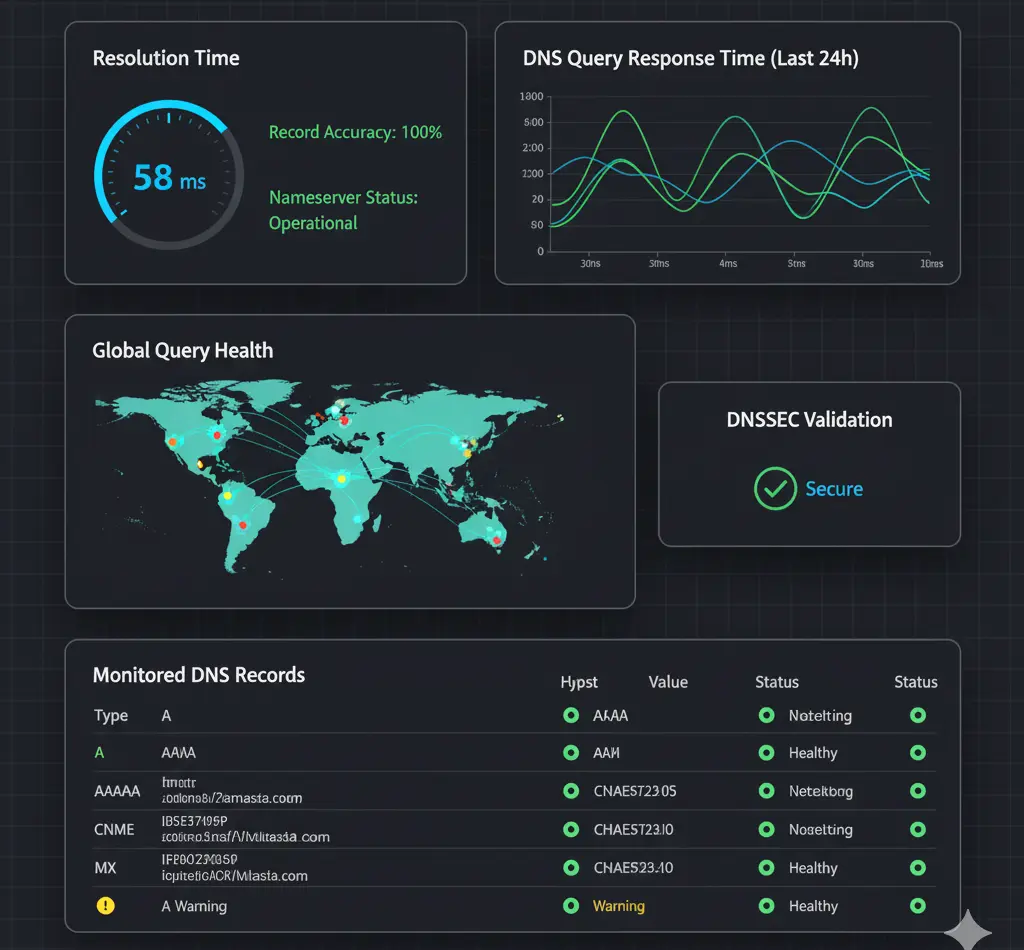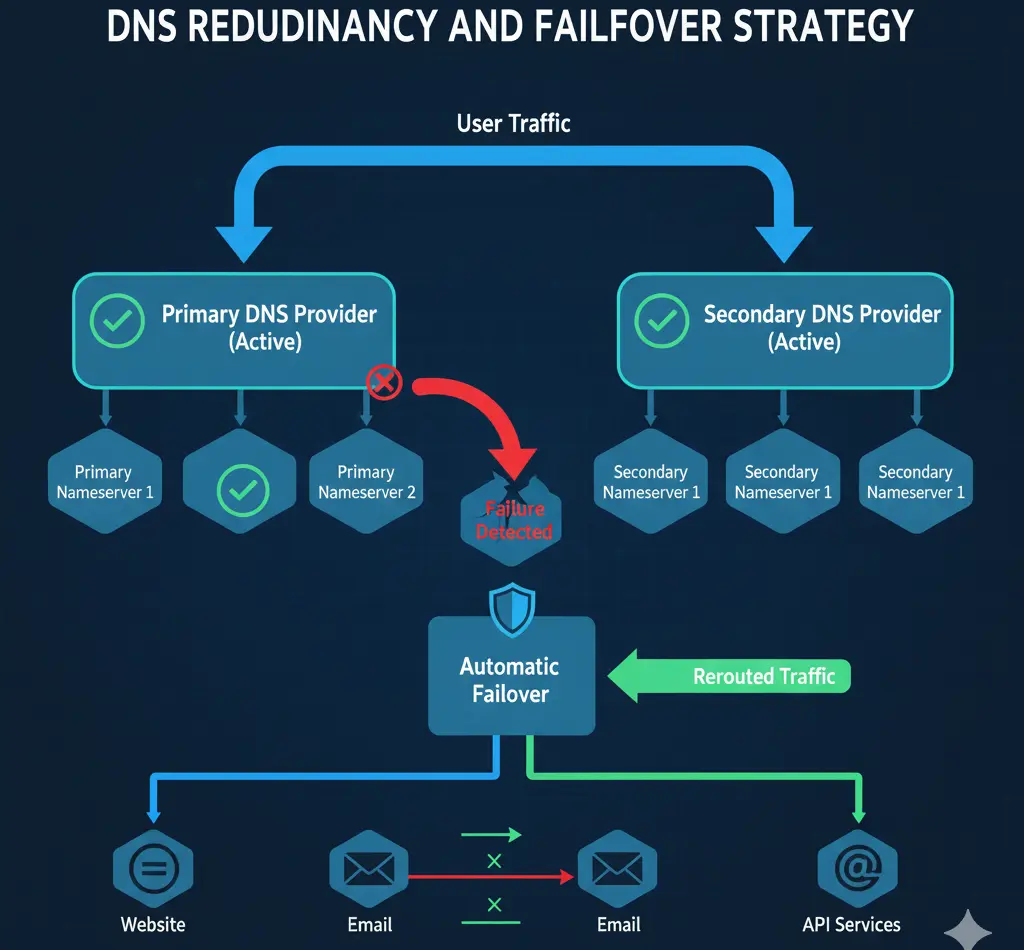DNS (Domain Name System) is the phonebook of the internet. When users type your domain into their browser, DNS servers translate that human-readable name into an IP address. If DNS fails, your website becomes completely unreachable - even if your servers are running perfectly.
 Many companies invest heavily in server redundancy, load balancers, and CDNs, but overlook DNS as a potential point of failure. This is a critical mistake.
Many companies invest heavily in server redundancy, load balancers, and CDNs, but overlook DNS as a potential point of failure. This is a critical mistake.
DNS failures are invisible to traditional uptime monitors. Your web server might be responding perfectly, but if DNS resolution fails, users see an error message.
DNS changes don't happen instantly. It can take hours or even days for changes to propagate globally. During this time, some users might see old records while others see new ones.
Time-to-Live (TTL) settings control how long DNS records are cached. Set it too high, and updates take forever. Set it too low, and you increase DNS query load and potential costs.
Even major DNS providers experience outages. In 2021, multiple high-profile DNS outages took down major websites for hours.

Attackers can manipulate DNS records to redirect traffic to malicious servers. This is often invisible to users until it's too late.
 Resolution Time: Track how long DNS queries take from different geographic locations. Slow resolution degrades user experience.
Resolution Time: Track how long DNS queries take from different geographic locations. Slow resolution degrades user experience.
Record Accuracy: Verify that your DNS records return the correct values. Changes should be validated immediately.
DNSSEC Validation: If you use DNSSEC, monitor its validation status to ensure security features are working correctly.
Multiple Nameservers: Check that all your nameservers are responding correctly and returning consistent results.
Global Availability: Monitor DNS resolution from multiple continents to catch regional issues.
Use multiple DNS providers for redundancy. If one provider fails, the others can continue serving queries.
Set appropriate TTL values based on how frequently you update records. Lower TTLs before making changes, then raise them afterward.
Implement DNSSEC to protect against DNS spoofing and cache poisoning attacks.
Monitor DNS from the same locations as your users. A DNS server might work perfectly from your office but fail for users in Asia.
DNS failures are catastrophic. Unlike a server issue that might affect some users, a DNS failure makes your entire online presence disappear.
E-commerce sites lose revenue every second they're unreachable. SaaS applications break customer workflows. Even a 5-minute DNS outage can result in significant business impact.
Start by monitoring your primary DNS records (A, AAAA, CNAME, MX) from multiple locations. Ensure they resolve correctly and quickly.
Set up alerts for resolution failures, slow queries, and unexpected record changes. These can indicate attacks or misconfigurations.
Test your DNS failover strategy. What happens if your primary DNS provider goes down? Do your secondary nameservers take over seamlessly?

DNS monitoring is not optional - it's essential. Your website's availability depends on it. Don't wait for a DNS outage to realize its importance.
With proper DNS monitoring, you can detect issues before they affect users, respond quickly to problems, and maintain the reliability your customers expect.
DNS (Domain Name System) is the phonebook of the internet. When users type your domain into their browser, DNS servers translate that human-readable name into an IP address. If DNS fails, your website becomes completely unreachable - even if your servers are running perfectly.
The Hidden Single Point of Failure
DNS failures are invisible to traditional uptime monitors. Your web server might be responding perfectly, but if DNS resolution fails, users see an error message.
Common DNS Issues
Propagation Delays
DNS changes don't happen instantly. It can take hours or even days for changes to propagate globally. During this time, some users might see old records while others see new ones.
TTL Misconfigurations
Time-to-Live (TTL) settings control how long DNS records are cached. Set it too high, and updates take forever. Set it too low, and you increase DNS query load and potential costs.
Provider Outages
Even major DNS providers experience outages. In 2021, multiple high-profile DNS outages took down major websites for hours.
DNS Hijacking
Attackers can manipulate DNS records to redirect traffic to malicious servers. This is often invisible to users until it's too late.
What to Monitor
Record Accuracy: Verify that your DNS records return the correct values. Changes should be validated immediately.
DNSSEC Validation: If you use DNSSEC, monitor its validation status to ensure security features are working correctly.
Multiple Nameservers: Check that all your nameservers are responding correctly and returning consistent results.
Global Availability: Monitor DNS resolution from multiple continents to catch regional issues.
Best Practices
Use multiple DNS providers for redundancy. If one provider fails, the others can continue serving queries.
Set appropriate TTL values based on how frequently you update records. Lower TTLs before making changes, then raise them afterward.
Implement DNSSEC to protect against DNS spoofing and cache poisoning attacks.
Monitor DNS from the same locations as your users. A DNS server might work perfectly from your office but fail for users in Asia.
The Cost of DNS Downtime
DNS failures are catastrophic. Unlike a server issue that might affect some users, a DNS failure makes your entire online presence disappear.
E-commerce sites lose revenue every second they're unreachable. SaaS applications break customer workflows. Even a 5-minute DNS outage can result in significant business impact.
Getting Started with DNS Monitoring
Start by monitoring your primary DNS records (A, AAAA, CNAME, MX) from multiple locations. Ensure they resolve correctly and quickly.
Set up alerts for resolution failures, slow queries, and unexpected record changes. These can indicate attacks or misconfigurations.
Test your DNS failover strategy. What happens if your primary DNS provider goes down? Do your secondary nameservers take over seamlessly?
Conclusion
DNS monitoring is not optional - it's essential. Your website's availability depends on it. Don't wait for a DNS outage to realize its importance.
With proper DNS monitoring, you can detect issues before they affect users, respond quickly to problems, and maintain the reliability your customers expect.